Cultural Appropriation vs Cultural Appreciation & Africa Travel

It was August 2017. I was leading my first private tour in Kenya for two couples from the US.
I was hanging out with my friends Dickson and Mike, two Maasai from the village next to Mara Explorers, owned by my friends Laura & Moses.
I met Dickson and Mike a few years ago and we became friends. We talk very openly. I can ask them anything about their culture (and often do) and they are also interested in my culture too. Often we talk about just regular things, like the news, politics, safari, people.
They often call me by the Maasai name they gave me, Naserian, which means “blessed one”.
When I’m in the Mara, Mike and his wife Jane usually invite me round to their home and we share masala tea and chapatis. Jane and I usually exchange gifts.
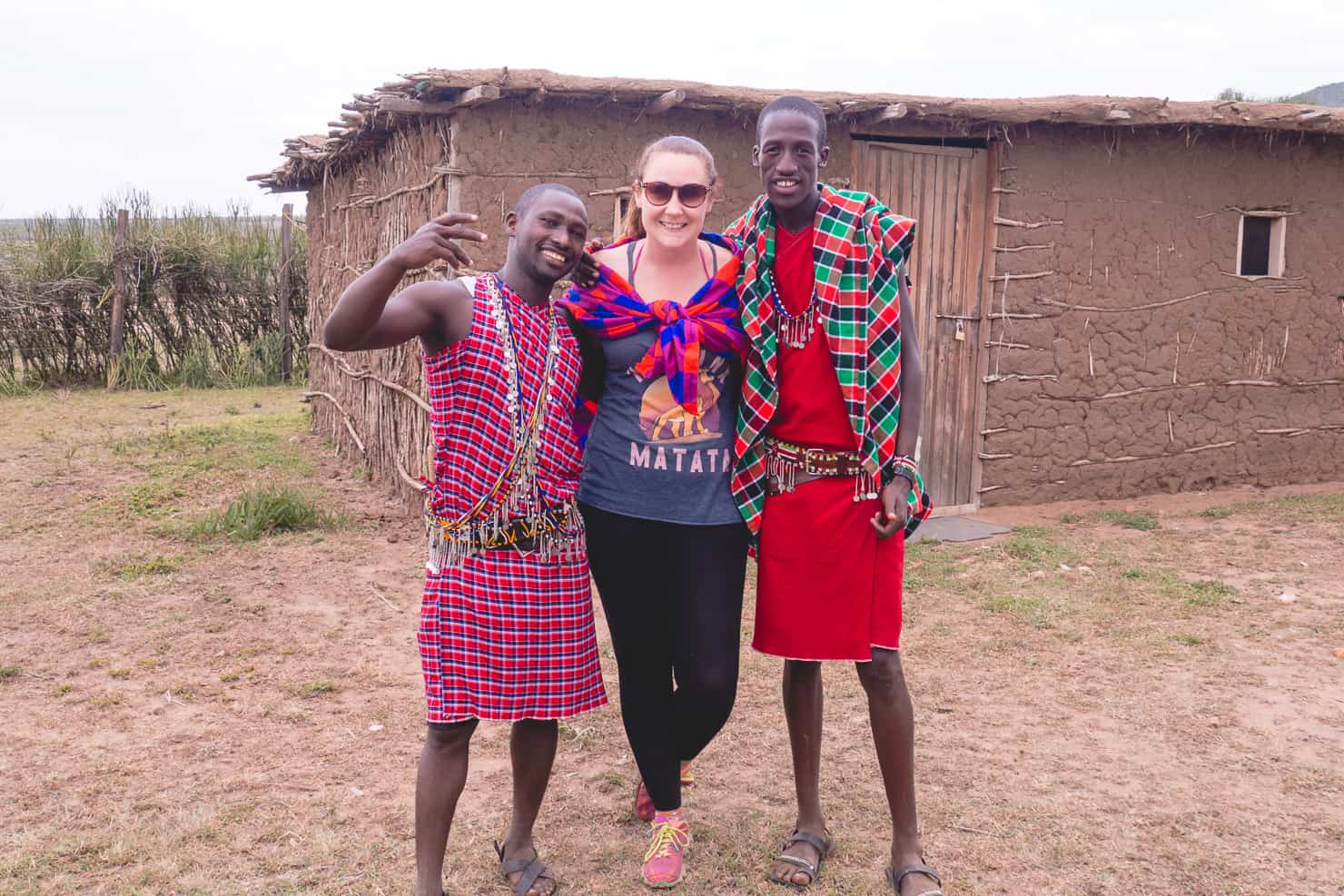
On this occasion, we were talking about their clothes. I already own a few Maasai shukas (blankets) that the Maasai wear and generally buy a different one each time I go to the Maasai Mara as they’re great for keeping warm on a cold safari morning.
I also have a lot of Maasai-made jewellery picked up on my travels around Kenya & Tanzania.
I was admiring their colourful clothing and beaded belts adorned with dangly silver chains when Mike said that as I was an “honourary Maasai”, I should get some Maasai clothes of my own. He said his mum could add the silver dangly bits to the belt if I bought the rest.
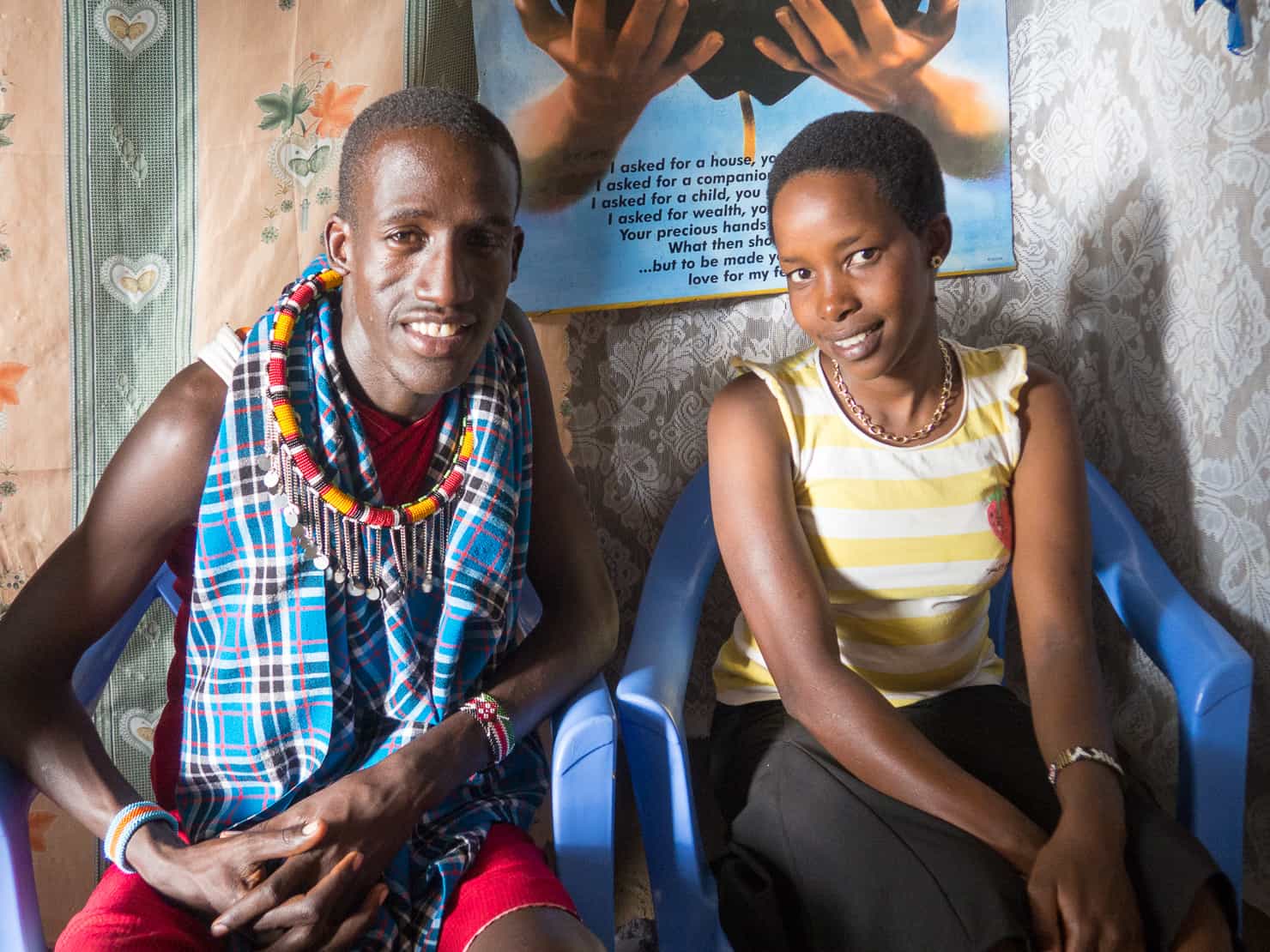
That day Mike was taking my clients out on safari, but Dickson wasn’t working so he suggested that we go shopping in the nearby township of Sekenani to buy my outfit. This sounded awesome, so we arranged to meet after breakfast.
After breakfast, I called at the village, picked up Dickson and we walked the 4km into town.
On the way, we met a smartly-dressed Maasai lady, returning from church who gave me a headband. I offered to pay, but Dickson insisted that it was a present and I should accept it, which I did.
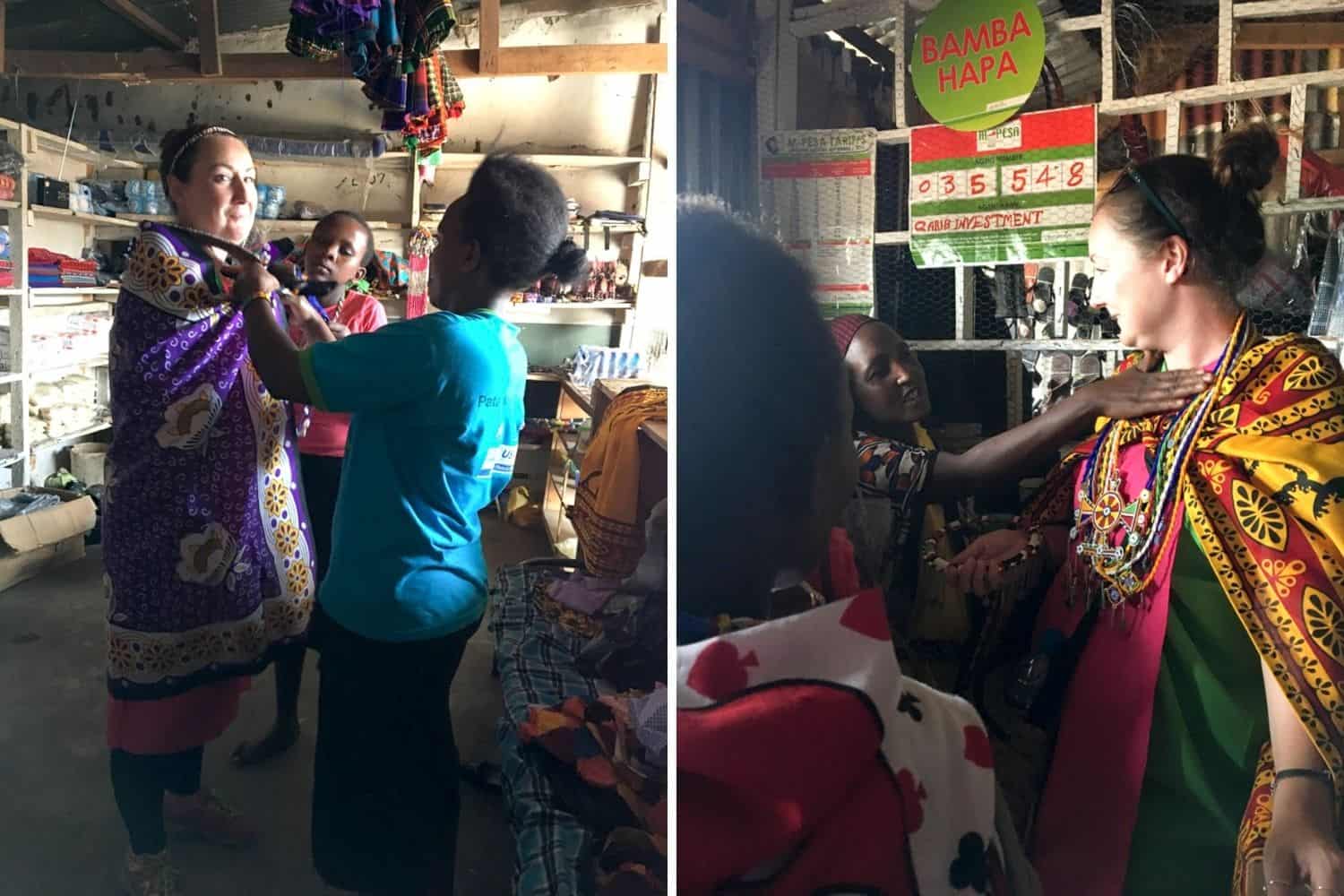
We arrived at a small shop selling the clothes that the Maasai women wear.
I ended up buying two cotton shukas like the Maasai women wear, a pink one and a green one, as well as two lesos (the shawl I am wearing in the below picture) and a beaded belt. Before I knew it, the lady in the shop had thrown the shukas over my head and insisted I wear them to walk home in.
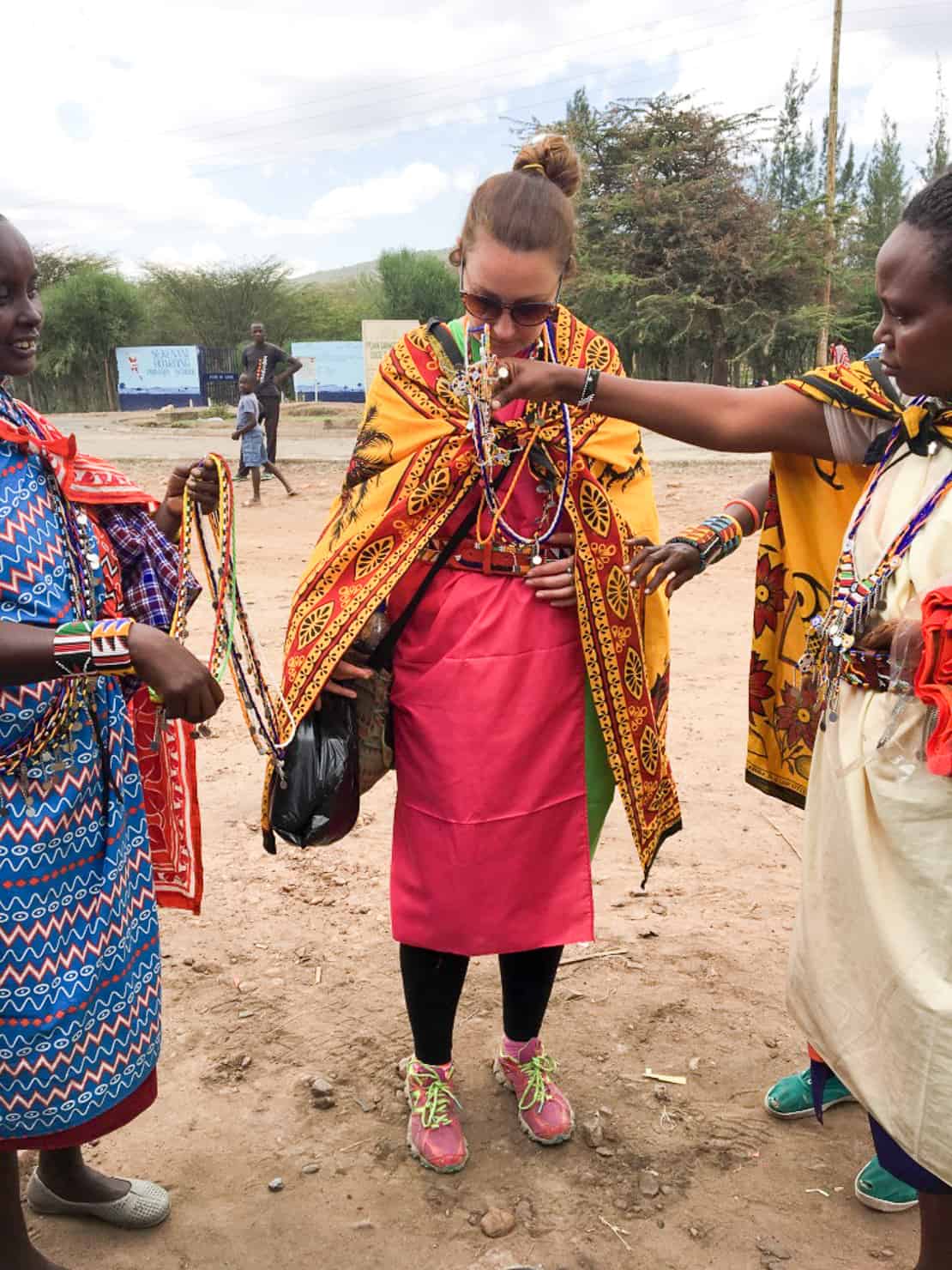
Word had obviously got around that there was a tourist in town who was in a buying mood (you don’t find many tourists here, aside from those checking in at the nearby Sekenani park gate), and a group of the local Maasai women hovering at the door of the shop.
They were selling bangles, earrings, and necklaces and I ended up buying a necklace from one of the ladies.
As I walked home, we attracted quite a bit of attention, as you can imagine.
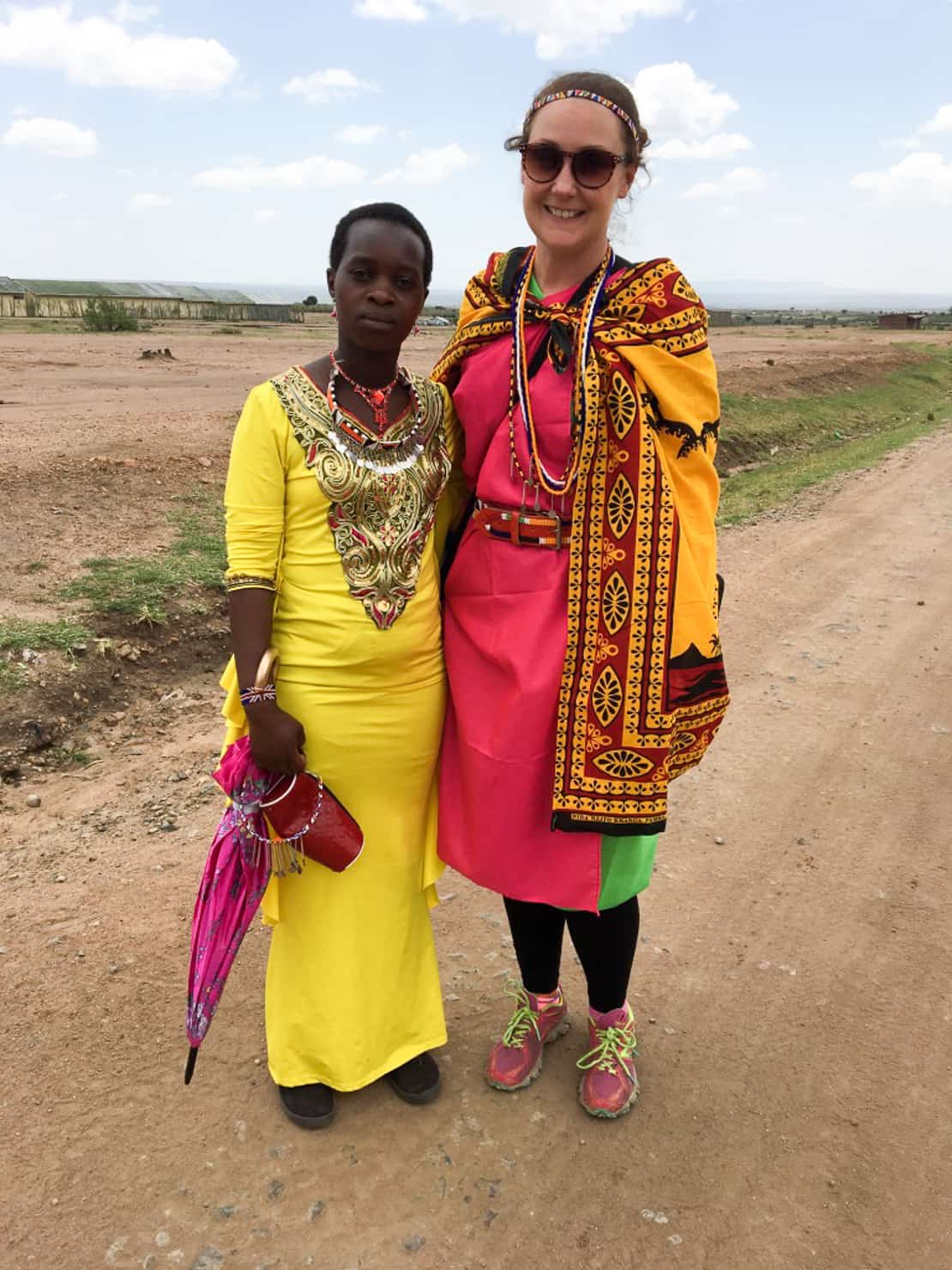
People came running over to tell me how “smart” or “beautiful” I looked. Was I Dickson’s new wife? Was one of the most commonly asked questions.
We ran into the lady who had given me the headband and she asked to have her photo taken with me.
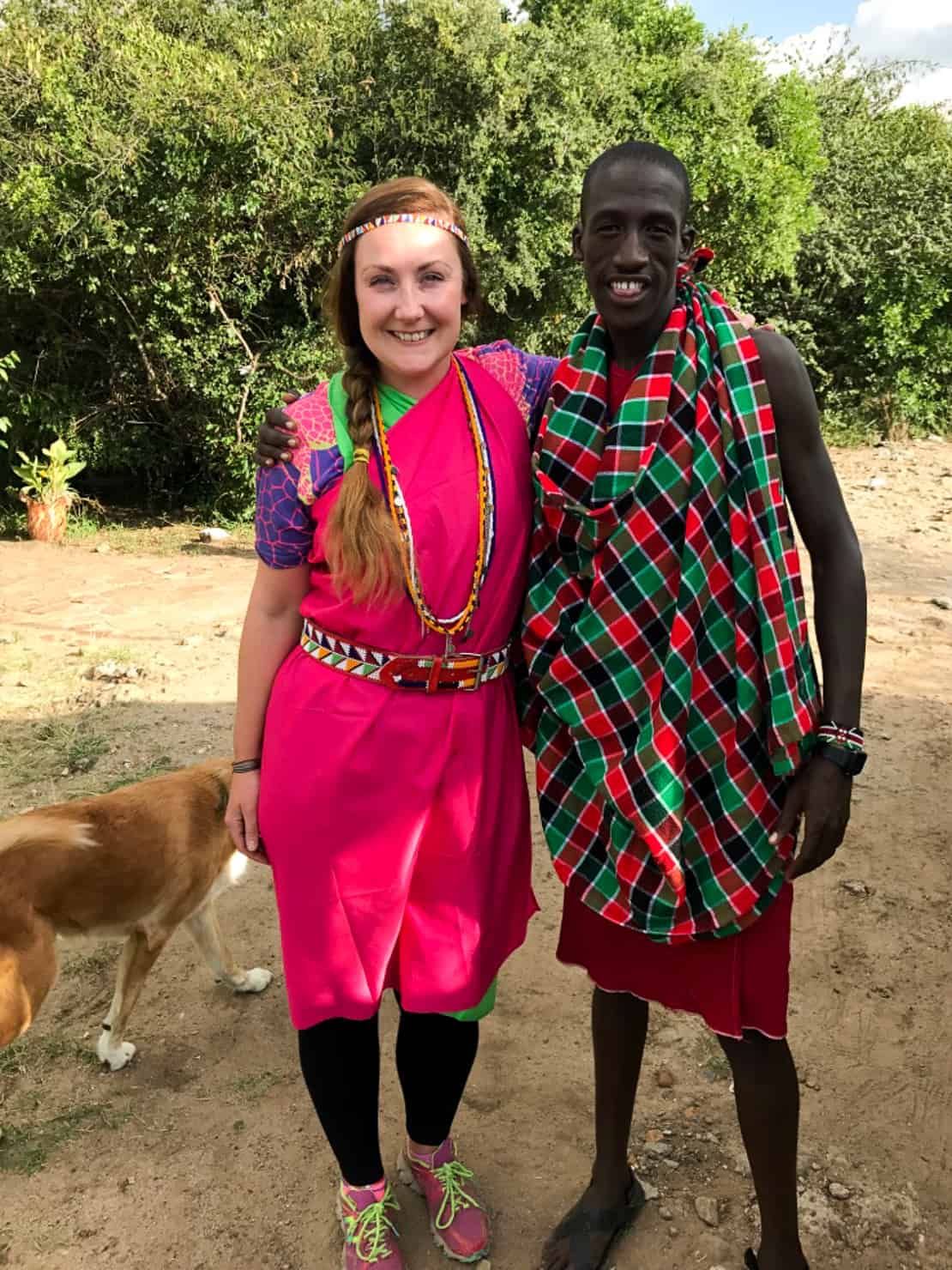
When Mike returned from safari he was super impressed when he saw my ‘transformation’. He too said I looked smart and I wore my new clothes for the rest of the day.
It was only about a year or so later that I even became aware of the term cultural appropriation. I always try to be a responsible traveller, but wondered if I was guilty of that in this situation?
Cultural Appropriation vs Cultural Appreciation & Africa Travel

What is Cultural Appropriation?
The Cambridge Dictionary defines cultural appropriation as ”œthe act of taking or using things from a culture that is not your own, especially without showing that you understand or respect this culture.”
In this video, Travel Blogger and TV Host, Oneika Raymond says:
“Cultural appropriation occurs when a dominant culture adopts elements of a minority culture not because they’re genuinely interested or connected to it, but because it’s fun, cool, edgy or even profitable.”
In this particular video, Oneika is referencing Coachella a music festival in California that is known for cultural appropriation.
More specifically for people taking items of sacred cultural significance from a marginalised group and wearing them as a fashion statement or as a costume.
And most of the people who are wearing these items have no understanding or appreciation for the culture they are appropriating/taking away from.
But this isn’t just an issue at Coachella, it’s many festivals around the world. And it’s not just festivals, it crosses into art, music, religion, food, hairstyles, fashion… all elements of life.

Cultural Appreciation or Cultural Appropriation?
Cultures have been evolving and borrowed since the beginning of time. But when do inspiration and appreciation become appropriation?
Celebrities are often the worst offenders when it comes to cultural appropriation. One of the most famous examples was when supermodel Karlie Kloss wore a Native American headdress, moccasins, and a fringed bikini at the Victoria’s Secret catwalk show.
Adele came under fire last year after she wore a bikini top printed with the Jamaican flag, with her hair in Bantu knots, in a picture referencing the Notting Hill Carnival. An annual event that celebrates Black British culture in her home city of London. The caption read “Happy what would be Notting Hill Carnival my beloved London.”
The opinions were divided. Some people slammed her for cultural appropriation. Others, including many Jamaicans/Jamaican descendants, praised the look.
The use of the word “Namaste” at the beginning or end of yoga lessons has been called cultural appropriation.
Now, I am a yoga teacher and I was taught by Indian teachers at a Goan yoga school, who taught me to say Namaste at the beginning and end of my lessons. The way they taught me, is that yoga is something that cannot be owned or stolen, only taught and shared.
I always think of this as an appreciation of the origins of yoga which dates back to ancient India and I fully believe in the sentiment. There is no word in the English language that even comes close to being able to capture the beauty and the essence of yoga.
Without honouring the roots of yoga, it could be very easy for the true purpose of yoga to be lost. But does that mean that I have any right to use it?

I love African fabrics. In the above picture, I’m at the Lake of Stars festival in Malawi, wearing a dress that I had made in Zambia, with material bought at a Zambian market.
But is wearing something or being inspired by something from another culture always cultural appropriation?
I think it very much depends on the circumstances. Then again, I am a white woman, so my experience is coming from a place of privilege.
I’m no expert and I don’t have all the answers here. But I am interested in opening a dialogue and learning from others’ opinions and thoughts on the subject.
Through my research, I’ve learned that there is a very thin line between cultural appropriation and cultural appreciation.

A Thin Line
“It comes down to the spirit in which you wear a garment, and whether that spirit communicates respect versus condescension. The line between celebration and appropriation gets crossed when there is the unacknowledged or inappropriate adoption of the customs, practices, or ideas of one group by another, typically more dominant group. It comes down to whether you’re aware of a look’s cultural history, whether you give credit where it is due (as opposed to renaming the style), and how you honor whatever you are borrowing. So borrow away) just be conscious about it.”
Similarly, in this video Franchesca “Chescaleigh” Ramsey, talks about circumstances that it might be appropriate to wear something from another culture. She says:
“Say you’re invited to an Indian wedding and you’re not Indian, wearing a traditional sari or getting henna would be a great example of cultural exchange. You’re bring invited to participate, enjoy the culture instead of just picking and choosing parts of it for yourself.”
Going by the explanation above, me wearing Maasai clothes in that situation was cultural appreciation, as I was invited to partake in a cultural exchange by friends who are of that culture. This is not a case of dominance, exploitation, or oppression.
However, if I were to then wear that outfit to a costume party, reinforcing stereotypes or making fun of a culture, that would not be ok and that would cross over the line into cultural appropriation.
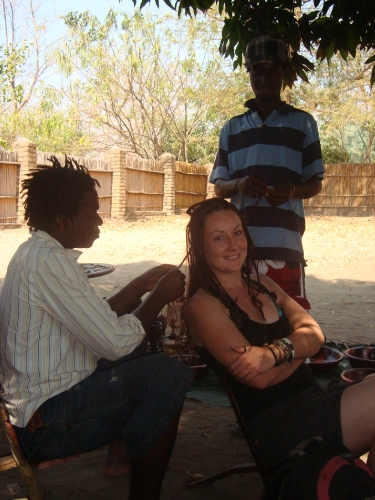
That’s not to say I haven’t been guilty of cultural appropriation in the past. I definitely have. I admit that and I am 100% sorry for it.
At the time, I didn’t know any better. But what I can do is learn, apologise, move forward, and try to help bring awareness to the issue.
Either way, I know that I, as a white woman dressing in traditional Maasai clothes, may upset some people – regardless of my intentions or the story behind it.

But then what about in other scenarios? What about wearing African print? Or African jewellery?
When I travel I buy quite a lot of stuff because I like to support local businesses, they’re a reminder of a place I love and I genuinely like the items.
But does that mean I have any right to wear those things? I honestly don’t know.
I’m sure some people will say yes, and some will say no.
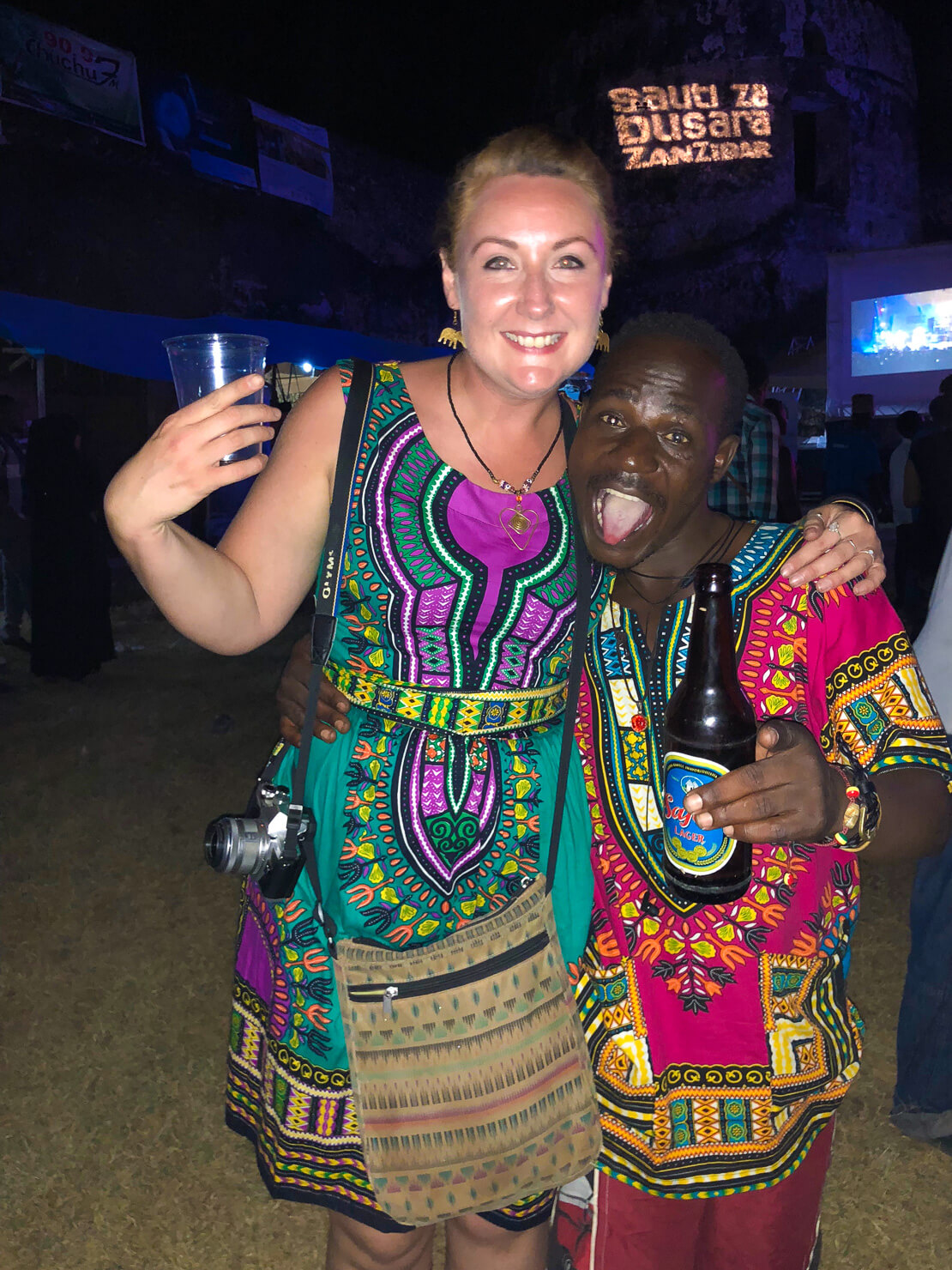
Exchanging Cultures & Globalization
I have blankets, fabric, scarves, bags, clothes, art, and jewellery from every single African country I’ve been to. And I want to wear them. If I can’t wear them, what is the point in buying them?
I have outfits and skirts made from African fabrics. Most of which I bought at local market stalls and had made up into items of clothing by a local tailor. I have Dashiki shirts and dresses. And I wear them often – both in Africa in the UK.
Me and the guy in the picture above bonded at the Sauti za Busara festival due to the fact we were wearing matching outfits.
But does wearing things you’ve bought in Africa make you politically incorrect? Culturally insensitive? Or demeaning?
Or does it make you appreciative and respectful?
In an article for The Atlantic, Jenni Avins says:
“In the 21st Century, cultural appropriation – like globalization – isn’t just inevitable; it’s potentially positive. The exchange of ideas, styles, and traditions is one of the tenets and joys of a modern, multicultural society.”
She also says:
“And while I hope I don’t offend anyone, I find the alternative – the idea that I ought to stay in the cultural lane I was born into – outrageous.”

When I travel in Zanzibar, I often wear a Dera dress. You can buy these all over East Africa and they are very common. Some say they originated in Somalia, some say the Middle East… either way they’re popular all along the Swahili coast.
I love them. They’re comfortable, they’re flattering, they’re covered up and therefore very suitable attire for a woman in Zanzibar. The reaction I’ve always gotten is extremely positive to the fact that I am abiding by the cultural guidelines of Zanzibar. “Wow, you look like a Swahili woman” and “You look very respectful” are two comments that I remember.
Is dressing as the locals do less respectful than dressing in shorts and a bikini top in a Muslim culture? Judging by the Zanzibar Facebook groups – definitely not!
In this article in Everyday Feminism, Jarune Uwujaren explains:
“That doesn’t mean that cultural exchange never happens, or that we can never partake in one another’s cultures. But there needs to be some element of mutual understanding, equality, and respect for it to be a true exchange. That’s what cultural exchange can look like ”“ engaging with a culture as a respectful and humble guest, invitation only.”
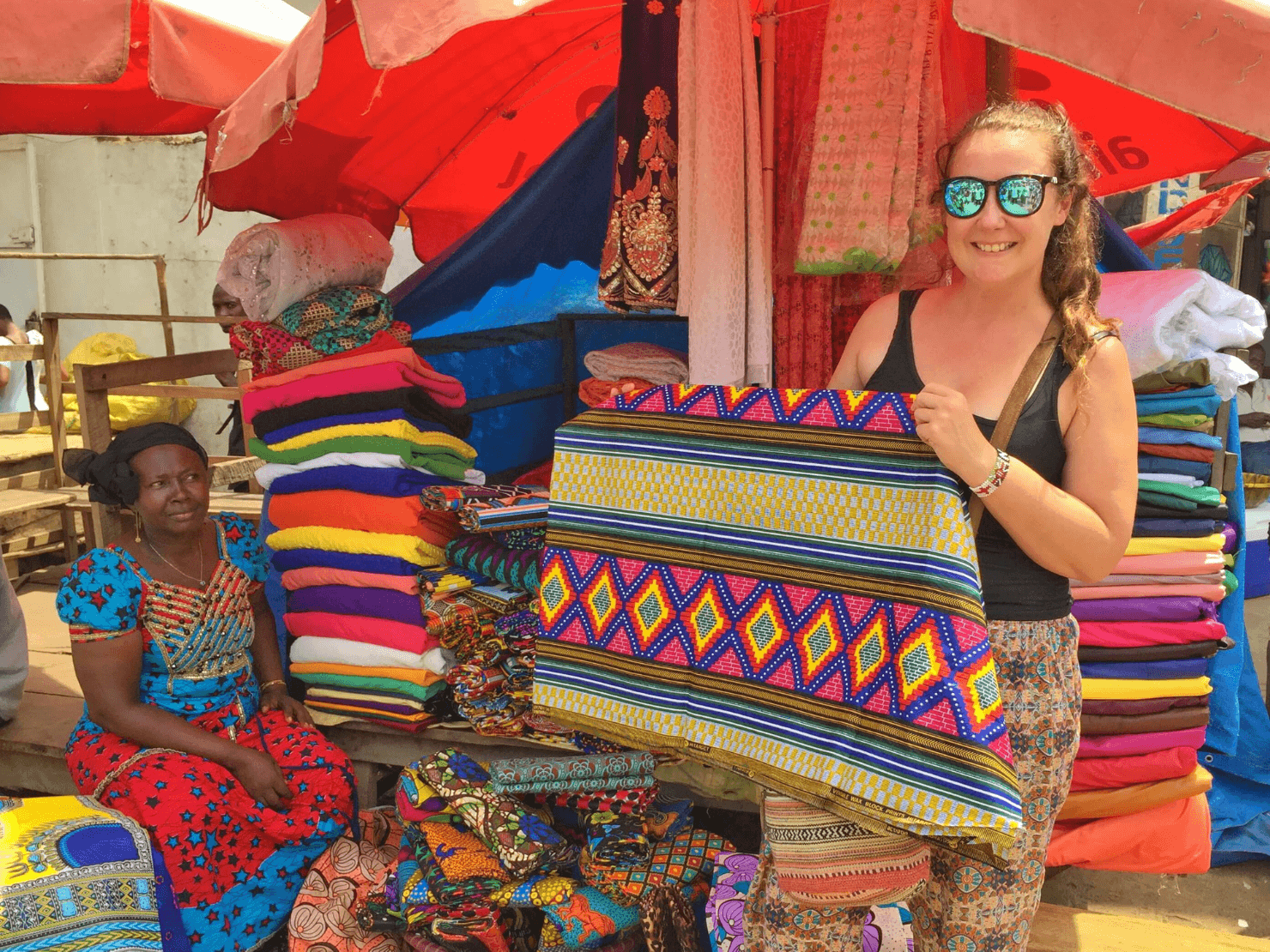
What’s Not Ok?
Passing something off as your own idea without giving appropriate credit or taking religious, sacred, or culturally significant items and trivialising or making fun of them is not ok. Wearing someone else’s culture as a costume is not ok.
I have the utmost respect and admiration for African cultures and in my (humble) opinion, wearing something you’ve bought in Africa, such as a dress or a bag or a pair of earrings, to show your respect for the culture, in a tasteful manner, without it being a costume, is generally ok.
Not that I can speak for every African or the African diaspora, I definitely can’t, but in my experience of travelling in Africa, people are usually pleased that you are embracing the culture and supporting the local economies
But that’s just my thoughts, others will think differently, I’m sure.

Professor Mayra Monroy says:
“Be aware that donning a culture’s dress comes with great responsibility. Let’s say you’ve been gifted a piece of jewelry from Afghanistan or bought a traditional embroidered shirt from Mexico and are wondering whether to wear it. Find out what that clothing, design, print or jewelry symbolizes within the culture and what it might mean for an outsider to wear it.”
If you are unsure, I suggest you read this article by Kim Tran which has some great questions to ask yourself.
I’d like to leave it there, as I said, I am not an expert and am open to hearing others’ views on the subject.
Other Africa posts you might enjoy…
- My Top Africa Travel Tips (After 11 Years of Travelling the Continent)
- The 25 Best Places in Africa for Solo Travellers
- My Complete Africa Packing List (Plus FREE Africa Packing Checklist)
- 10 Reasons to Take a Group Tour in Africa
- The Ethics of Visiting an African Tribe: What You Need to Know
- The Best Places in Africa to See Elephants
- 16 of Africa’s Most Incredible Hiking Destinations
- Solo Travel in Africa vs. Taking a Group Tour
- Backpacking Africa: 39 Things You Need To Know Before You Go
- How To Plan Your Dream Trip To Africa (in 18 easy steps)
Have you ever taken a group tour in Africa? Any other thoughts on the pros of taking a group tour in Africa?
Join one of my Africa group tours or buy my Backpacking Africa e-book!

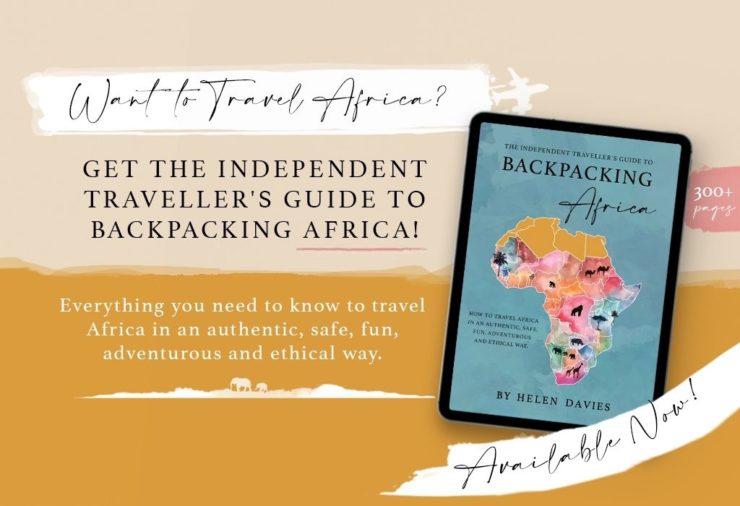







This is a great subject to open up for discussion. There will always be people who choose to think the worst of others, throwing accusations around. Knowing you, I have no doubt that when you have worn locally bought clothes, you’ve done it with respect, knowledge and goodness in your heart. It’s definitely a case of shades and degrees. I wear (and, in fact, own) an abaya for visiting mosques. I don’t do this because I think it’s cool or fun, I do it because I don’t want to offend anyone by turning up to a religious building with a dress that bit too short or shoulders not quite covered. At the same time, when I’ve found myself in Mexican ‘themed’ restaurants in the UK, I’ve declined the bejewelled Mexican sombrero because I have Mexican friends and the stereotyping makes me cringe. That said, there will be moments from my past where I would have worn the hat because, as you say, I didn’t know better. Go forth with a good heart and do your best seems the only true way. A movement doesn’t come when we have a small number of people doing things perfectly, it happens when we have a large number of people giving the topic more thought and making a personal pledge to do better. Thanks for such a great and honest read.
Thank you for reading Jo. Yes, it’s definitely a messy subject but the best we can do is learn from mistakes, try to do better and help to educate other people when we see something that’s not sitting well and culturally appropriating.
I really think that purchasing souvenirs in that way and then enjoying them or wearing them later is totally fine. The line would be if you profited off it or made fun of it. I certainly have souvenirs from my travels that I bought from locals and they were very happy that I was interested.
Thanks for reading Natalie! Yes I totally agree!
Great blog post and such an important topic. I totally agree it depends in which context you wear traditional clothing. And respect towards the culture plays a huge role. I love my time in Tanzania. Culture exchange is so important, we can learn so much from each other
Super blog article, Very informative. Thank God that I came across this article since I’ll be travelling to Africa in June. Do you think I’ll be able to Africa in June?
Which country are you visiting and where are you from? It depends on a lot of factors! 🙂
Hi Helen, I am so glad you wrote about this! I have recently been thinking about this subject.. I have joined a dinner club and every month it is hosted by someone else and the menu is from a different country. In a couple of months it is going to be an Indian dinner. I have some beautiful sarees I purchased in India and have pondered whether it would be disrespectful, or if it would be acceptable/appropriate/okay to wear one? Curious to others thoughts on this. I remember the guy in the picture from the musical festival! He was quite the “character”!
Hi Marsha,
I personally think it’s fine to wear your saris for this occasion. You bought them in India – it would be a shame for them to sit in a closet forevermore! I think it would be a nice tribute.
Ha ha, yes that guy was funny wasn’t he! My twin!
Such a great read! It makes me sad that ‘cultural appropriation’ is making people nervous of sharing and celebrating other’s cultures. We run the risk these days of being so politically correct that we are all afraid to do or say anything and that is not a world I want to live in.
I really believe it’s how you do it and your intent and integrity. When the Trudeau family visited India, it looked like they’d raided the high school drama class dress up box and it was a global embarrassment. It lacked integrity and understanding.
However, having grown up in Afria, I find the African culture is all about sharing and locals are so often proud to share their clothing, jewellry, beading etc. with visitors. It’s a great honour when visitors wear them. Especially, as in your case, if you have locals helping you or offering gifts. It would be rude not to show them off. You are also supporting local economies which can never be scoffed at. I’ve experienced the same in India and Nepal where people have been in awe of me showing interest in their clothes, they’re so proud of their heritage and want to share it with those who are interested.
I’ve always worn ‘local’ clothing in areas where I want to be sure not to offend anyone – covering up, hiding body parts, not standing out etc. to me is a sign of respect and helps with safety. It says ‘I respect your customs/ culture in your country. Therefore, I respect you!’.
And, if someone at a keyboard who’s never travelled out of their local area wants to lambast me from their pedestal, go ahead. They might just do the same if they find themselves half way around the world.
Hi Mara, yes I definitely agree. The world would be a very boring place if we didn’t learn from and appreciate each other’s cultures!! But there needs to be sensitivity around it. I think as long as people are respectful, there’s no issue which is why I wanted to write the post. The problem comes when people pick and choose parts of a culture they like, whilst discriminating against it in other ways! Thanks for commenting! 🙂
Very interesting take on a such a sensitive topic. I think the history of the interaction between ‘Old World’ and ‘New World’ cultures always comes into play on matters culture exchange. It shows hard in the fashion and movie industry where indigenous cultures are so often exorticised without relevant understanding; so much interest in what native people produce (clothing, music, dance food etc) yet so little time afforded to the people who produce these things. Remember the SA World Cup Zangalewa song ‘Its Time for Africa’ by Shakira. A media outcry pushed her to recognise the original creators of that song.
Why I am intrigued by your take on the topic is that you bring us a step into the lives of your Maa friends. You have invested time and words to explain the picture. We get to know about Mike and Dickson and his wife; other real people. You didn’t just pose in a picture adorned in African regalia. The focus ceases to be about you and your outfit and spreads to the people around you. You present us other protagonists. You scribble meaningful paragraphs about the ocean from which the fish live and swim. That is a trait and attitude which still escapes so many western writers and artists. Kudos!
In my opinion, appropriation seeps in when you take a fruit and have a scrumptious bite, with a bonus picture doing it, without even acknowledging the tree from which the fruit comes from. The tree is a sheer prop of your photoshoot yet it is supposed to be a main or supporting character.
Keep writing. Keep travelling.
Looking forward to reading more of your travel stories.
“Traveling—it leaves you speechless, then turns you into a storyteller.”- Ibn Battuta
I really enjoyed your post and hearing about your travels. I am a jewelry designer and metalsmith and love making and wearing jewelry with African beads and pendant purchased from African artisans on Etsy. I live in a very white state in the US, but work in a very diverse workplace. I’m not sure if it’s appropriate to wear jewelry I’ve made with African materials because I don’t want to offend anyone or be guilty of culture appropriation.